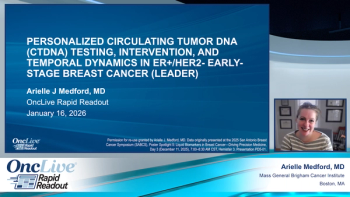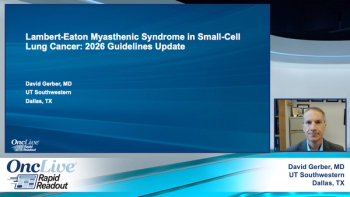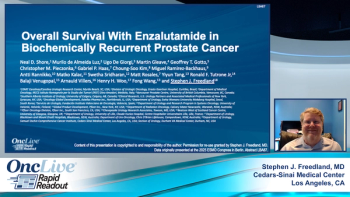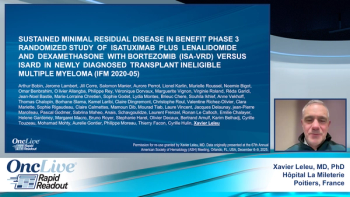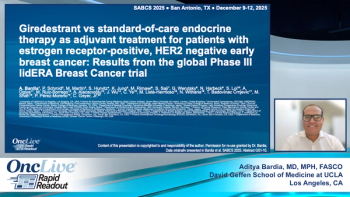
|Videos|June 21, 2023
INDIGO: A Phase 3 Global, Randomized, Double-Blinded Study of Vorasidenib vs Placebo in Patients with Residual or Recurrent Grade 2 Glioma with an IDH1/2 Mutation
Author(s)Timothy Cloughesy, MD

Timothy Cloughesy, MD, reviews data from the phase 3 INDIGO trial investigating vorasidenib in patients with residual or recurrent grade 2 glioma with an IDH1 or IDH2 mutation.
Advertisement
Background
- IDH1/2 mutations occur in most low-grade diffuse gliomas.
- IDH1/2 hotspot mutations occur in various cancers, including diffuse gliomas.
- IDH1/2 mutations result in:
- Overproduction of R-2-hydroxyglutarate
- Epigenetic dysregulation
- Impaired cellular differentiation
- Immunosuppressive tumor microenvironment
- Vorasidenib is an oral inhibitor of mutant IDH1 and IDH2 specifically designed for brain penetrance.
- Vorasidenib reduced tumor 2-HG by >90% in resected grade 2/3 non-enhancing diffuse glioma.
Methods
- Patients enrolled were ≥ 12 years of age with IDH1/2-mutated grade 2 oligodendroglioma or astrocytoma per WHO 2016 guidelines with prior surgery.
- Patients had measurable non-enhancing disease (≥1 target lesion measuring ≥1 cm x ≥1 cm), confirmed by blinded review.
- Patients were not in need of immediate chemotherapy or radiotherapy per investigator assessment.
- Patients were given 40 mg of vorasidenib orally once daily for 28-day cycles vs placebo.
- Centrally confirmed progressive disease permitted unblinding and crossover.
- Primary end point was progression-free survival [PFS].
- Key secondary end point was time from randomization to the initiation of first subsequent anticancer therapy or death because of any cause.
Results
- Estimated median PFS was 27.7 months for vorasidenib and 11.1 months for placebo, with a hazard ratio of 0.39.
- Time to next intervention [TTNI] was 17.8 months for placebo and wasn’t reached in the vorasidenib arm.
- At 24 months, an estimated 83.4% of patients in the vorasidenib arm had not initiated another therapy vs 27.0% of patients in the placebo arm.
- All subgroups favored vorasidenib.
- Treatment emergent adverse events:
- Liver function tests showed increased ALT and AST present in vorasidenib arm and not in placebo.
- Increased ALT and AST were reversible.
- Other adverse effects were fairly even matched throughout the study.
- No fatal treatment emergent adverse events
Conclusions
- At preplanned interim analysis, vorasidenib demonstrated a significant improvement in:
- PFS per BIRC
(HR 0.39, 95% CI 0.27–0.56; P=0.000000067) - TTNI
(HR 0.26, 95% CI 0.15–0.43; P=0.000000019)
- PFS per BIRC
- Diffuse gliomas with IDH1/2 mutations are not curable with current therapies and infiltrate the brain in the absence of treatment.
- Vorasidenib is an oral inhibitor of the mutant IDH1/2 enzymes with proven brain penetrance.
- Treatment with vorasidenib significantly improved imaging-based PFS and TTNI with a manageable safety profile in patients who were not in need of immediate chemotherapy or radiotherapy.
Mellinghoff IK, van den Bent MJ, Blumenthal DT et al. INDIGO: a Phase 3 global, randomized, double-blinded study of vorasidenib versus placebo in patients with residual or recurrent grade 2 glioma with an IDH1/2 mutation. Abstract presented at: 2023 ASCO Annual Meeting, June 2-6, 2023.
Funding supported by Servier Pharmaceuticals. Content independently developed by OncLive.
Advertisement
Latest CME
Advertisement
Advertisement
Trending on OncLive
1
Long-Term Cilta-Cel Data Show Low Rates of PFS Events in Standard-Risk R/R Myeloma
2
Nonresponse to Bridging Therapy and Peak ALC After Cilta-Cel Are Associated With Neurotoxicity, NRM in Myeloma
3
FDA Underscores Risks Associated With DPD Deficiency and Capecitabine/5-FU Use in Cancer Care
4
FDA Updates Axi-Cel Label to Remove Limitation of Use in R/R PCNSL
5


